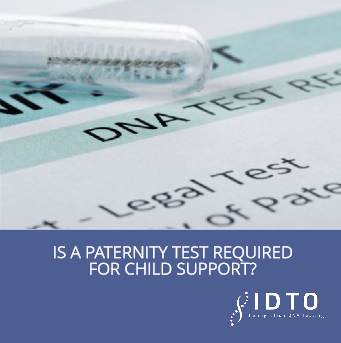
Is paternity testing required for child support?
Paternity testing is a tool used during the paternity establishment process for a family court judge to help determine the paternity of a child. While genetic testing is not a requirement, it helps judges determine if the alleged father is the biological father.
What is a child support paternity test?
A child support paternity test is a genetic test that can only be performed when a court order has been issued through the state or child support services.
How to get a court-ordered paternity test?
You must file a paternity petition with family court or child support services. The process for filing paternity requests will vary from state to state. After your petition is filed and accepted by the court. A court order to appear in court will be sent to the respondent.
What happens after paternity is established for child support?
Upon establishing paternity in a child support case, the judge will outline the father’s legal rights regarding child custody, visitation, and financial responsibilities. A completed and signed Voluntary Acknowledgment of Paternity form will be sent to your state’s Vital Records Birth Certificate office to add the legal father’s name to the child’s birth certificate.
What happens if the father does not show up for a paternity test for child support?
Failure to attend a court-ordered paternity test appointment does have serious consequences. The alleged father may be held in contempt of court, potentially facing fines or even jail time. In some cases, the court may issue a default judgment in favor of the mother, automatically declaring the alleged father as the legal father of the child.
Who pays for genetic testing
Paternity tests are often time paid for by the state or child services. Depending on the state you may be required to reimburse the state. Another factor that may be considered for the state to cover the paternity test is the financial status of the alleged father and mother.
Can a paternity test be performed without a court order?
Yes. A legal paternity test can be used as long the testing is performed by an AABB-accredited laboratory. If you need legal paternity testing services call IDTO DNA Testing Center at 888-204-0583 to schedule an appointment today.
Overcoming Paternity Presumption: Key Considerations
Understanding Paternity Presumption:
- In the U.S., if a child is conceived during a marriage, the husband is automatically presumed to be the child’s legal father, even if he’s not the biological father.
- This presumption has significant implications for child support, custody, and inheritance rights.
Potential Options for a Husband to Disprove Paternity:
- Filing a Paternity Petition: A husband who believes he is not the biological father can file a paternity petition with the family court.
- Establishing Biological Paternity: DNA testing is typically ordered to determine the child’s biological father.
- Cooperation of Biological Father: If the biological father is identified and willing to assume parental responsibilities, the court may terminate the legal father’s rights and obligations.
- Time Limits: It’s crucial to note that most states have time limits for filing paternity challenges, often within a few years of the child’s birth.
Important Clarifications:
- Biological Father’s Rights: Even if the husband is the legal father, the biological father may still have certain rights, such as the ability to petition for paternity and seek visitation or custody. State laws vary in this regard.
- Divorce Not Always Required: Disputing paternity does not necessarily require divorce proceedings. It can often be addressed through separate paternity actions.
Seeking Professional Guidance:
- Understanding paternity presumption laws and procedures can be complex. It’s recommended you consult with an experienced family law attorney in your state for specific advice and guidance regarding your circumstances.
Remember: Each state has its nuances regarding paternity laws. Ensuring accurate and timely action is essential to protect your rights and interests.

